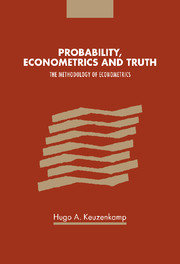Book contents
- Frontmatter
- Contents
- Introduction
- 1 The philosophy of induction
- 2 Probability and indifference
- Intermezzo: a formal scheme of reference
- 3 Relative frequency and induction
- 4 Probability and belief
- 5 The theory of simplicity
- 6 From probability to econometrics
- 7 Econometric modelling
- 8 In search of homogeneity
- 9 Positivism and the aims of econometrics
- 10 Probability, econometrics and truth
- Personalia
- References
- Name Index
- Subject Index
Intermezzo: a formal scheme of reference
Published online by Cambridge University Press: 22 September 2009
- Frontmatter
- Contents
- Introduction
- 1 The philosophy of induction
- 2 Probability and indifference
- Intermezzo: a formal scheme of reference
- 3 Relative frequency and induction
- 4 Probability and belief
- 5 The theory of simplicity
- 6 From probability to econometrics
- 7 Econometric modelling
- 8 In search of homogeneity
- 9 Positivism and the aims of econometrics
- 10 Probability, econometrics and truth
- Personalia
- References
- Name Index
- Subject Index
Summary
They wanted facts. Facts! They demanded facts from him, as if facts could explain anything!
Joseph Conrad, Lord JimIntroduction
The frequentist interpretation of probability dominates mainstream probability theory and econometric theory. Proponents of the frequency theory bolster its alleged objectivity, its exclusive reliance on facts. For this reason, it is sometimes called a ‘realistic’ theory (Cohen, 1989).
Keynes ([1921] CW VIII, p. 100) pays tribute to the English mathematician Leslie Ellis, for providing the first logical investigation of the frequency theory of probability. Ellis (1843) objects to relating probability to ignorance: ex nihilo nihil. John Venn ([1866] 1876) elaborated the frequency theory. Still, a theory which is formally satisfactory did not exist until the early twentieth century. In 1919, Richard von Mises formulated the foundations for a frequency theory of probabilistic inference (see von Mises, [1928] 1981, p. 224). His views are discussed in, section 2. Shortly after, Ronald Aylmer Fisher (1922) presented an alternative frequentist foundation of probabilistic inference. Section 3 deals with Fisher's theory. Today, the most popular frequentist theory of probability is based on yet another interpretation, due to Jerzy Neyman and Egon Pearson. This is the topic of, section 4. Popper's interpretation of probability, which is supposed to be entirely ‘objective’, is discussed in section 5. Section 6 offers a summary of the chapter.
- Type
- Chapter
- Information
- Probability, Econometrics and TruthThe Methodology of Econometrics, pp. 28 - 32Publisher: Cambridge University PressPrint publication year: 2000



